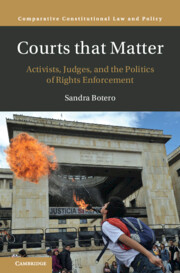‘Courts that Matter is the best book on judicial impact I’ve read in some time. Botero’s key empirical contribution is to highlight the use of monitoring mechanisms and collaborative oversight arenas by courts seeking to avoid some longstanding pitfalls facing effective implementation of their decisions. The book’s theoretical contribution is even more ambitious. Botero shows that at their best, judicial institutions sometimes collaborate with other key actors in the state and civil society to foster increased attention to, and deliberation about, entrenched practices of rights violation. Rather than displacing democratic politics from the outside, court decisions sometimes create new political spaces in which democratic politics can proceed.’
Thomas Moylan Keck - Michael O. Sawyer Chair of Constitutional Law and Politics, Syracuse University Maxwell School of Citizenship and Public Affairs
‘Courts That Matter is a must read for anyone interested in the big ‘so what?’ question of judicial politics: Do landmark court judgments make a difference in practice? – and, if so, when? and how? Through rigorous analysis of iconic judgments, Botero brings out their multidimensional influence on larger processes of change, and convincingly argues that monitoring mechanisms and legally empowered civil society organizations are significant in coproducing impact.’
Siri Gloppen - Professor of Comparative Politics and Founding Director, Centre on Law & Social Transformation, University of Bergen
‘This insightful study offers a careful and detailed comparative analysis of when and how courts can make a difference in complex socioeconomic rights cases. This is a must read for anyone interested in how rights can have an impact on the ground.'
David Landau - Mason Ladd Professor and Associate Dean for International Programs, Florida State University College of Law
‘In Courts that Matter, Sandra Botero squarely faces the challenging question of when and how these non-elected, non-representative political actors become effective agents of social change. Botero convincingly shows that whereas courts have ‘neither purse nor sword’ they do have much more than ‘merely judgement’. After rendering decisions in socioeconomic rights, courts can deploy a series of oversight mechanisms that help coordinate advocacy organizations and political actors to turn them into real social transformation. A series of well-crafted and engaging analyses of courts’ decisions in Argentina, Colombia, and India provide compelling evidence of the argument and shed light on its nuances. Courts that Matter is a great resource for social scientists, legal scholars, activists, and judges alike.’
Julio Ríos-Figueroa - Professor of Political Science and Law, ITAM, Mexico City
‘Courts have become central actors in some democracies of the Global South. This book specifies the social and institutional mechanisms that have made this phenomenon possible. Sandra Botero makes a fundamental contribution to understanding the long-standing debate on the ability of judges to bring about significant social and political change through their decisions.’
Mauricio García Villegas - Professor of Politics and International Relations, National University of Colombia



